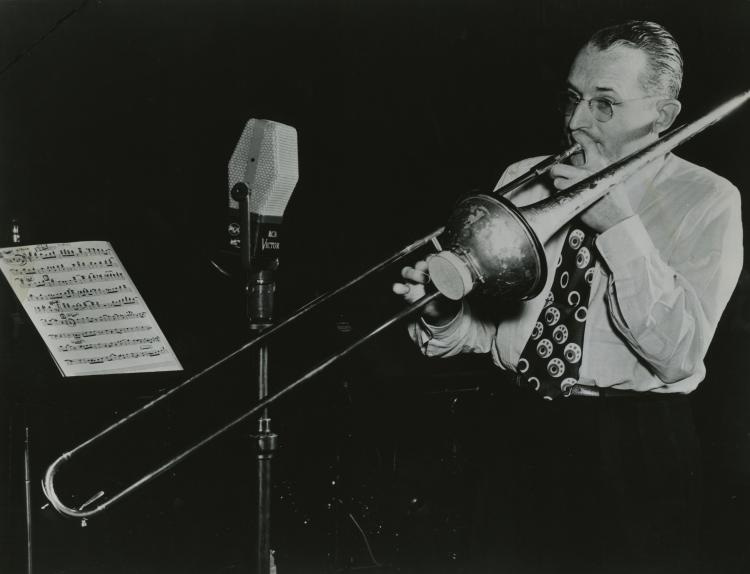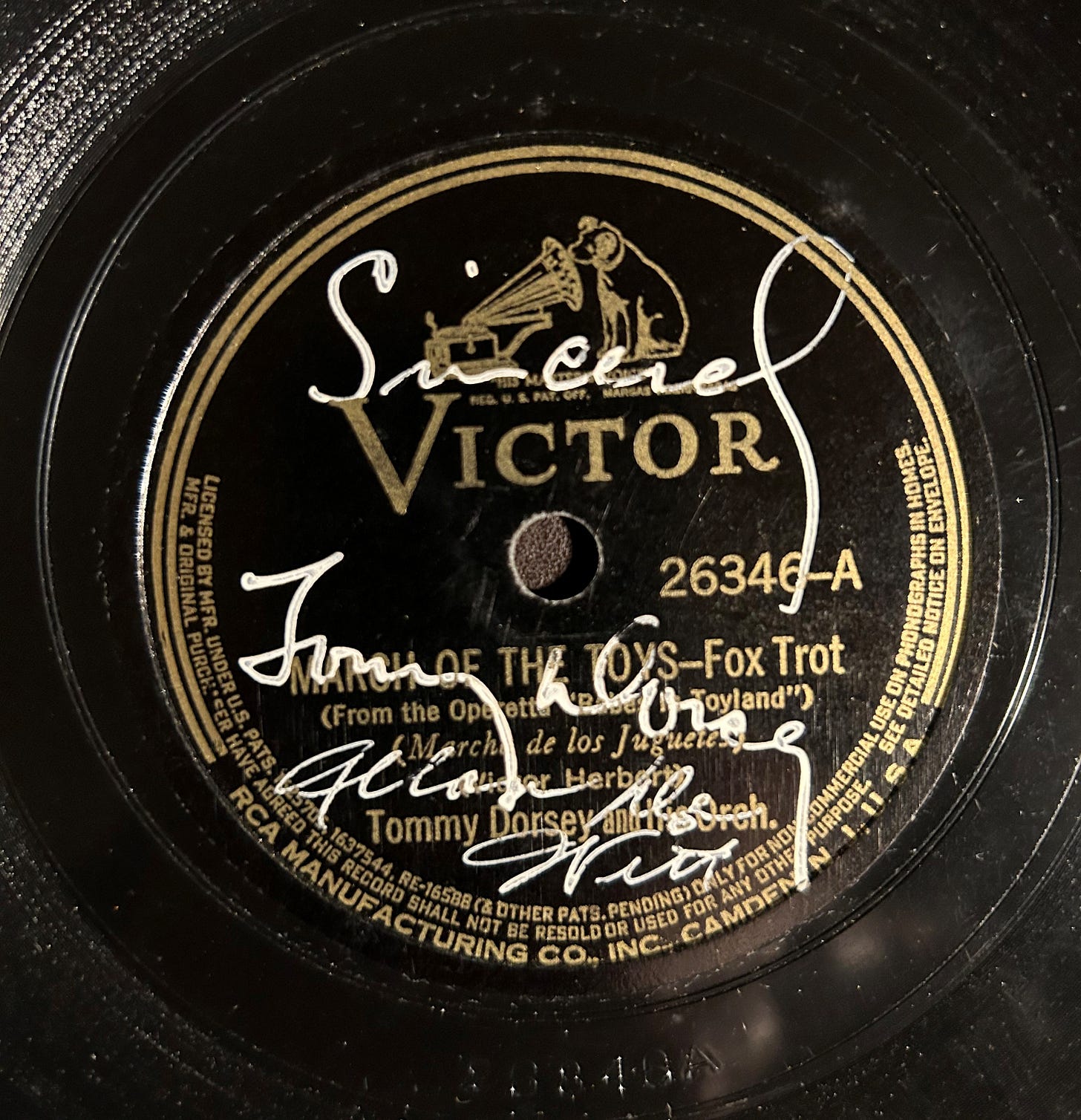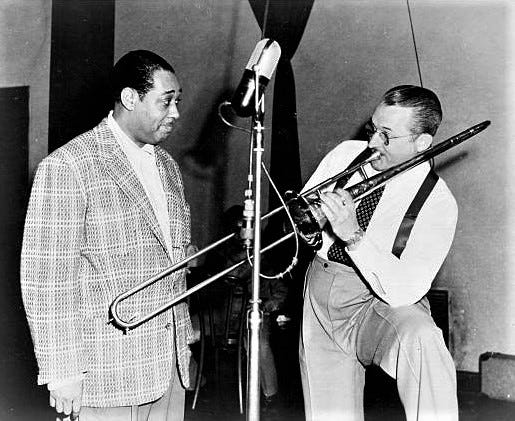In retrospect - and in big band history - Tommy Dorsey’s must be recognized as the greatest all-round dance band of them all. Others may have sounded more creative. Others may have swung harder and more consistently. Others may have developed more distinctive styles. But of all the hundreds of well-known bands, Tommy Dorsey’s could do more things better than any other could.
-George T. Simon, editor-in-chief of Metronome
Sixty-seven years ago tomorrow, on November 26, 1956, Tommy Dorsey died. He was only 51 years old. It’s always around Thanksgiving time that I remember him.
I think Tommy Dorsey is vastly underrated as both a musician and bandleader. The Dorsey band could swing hard when it wanted to. Particularly when Dorsey hired Sy Oliver from Jimmy Lunceford’s band in 1939. Just listen to Buddy DeFranco’s playing on Oliver’s Opus One – now that’s hip. Dorsey was known as the "Sentimental Gentleman of Swing" because of his smooth-toned trombone playing. Perhaps this association with swing over the years made him seem old-fashioned. But not with me.
My first From Fred Astaire to Sun Ra post was on October 18, 2020. So it’s been over two years now of weekly renderings on the music that shaped my Jazz journey, which started in the mid-1970s with the sounds of old movie musicals, like Fred Astaire singing Cole Porter’s Night and Day with the Leo Reisman Orchestra. You can read more about the journey here:
As a kid, I was listening to big band and swing music from the movies on TV before I knew that Jazz existed and before I ever heard about bebop. So I have a fondness for some of these old swing bands. They take me back and bring me peace.
So this week, on that Big River called Jazz, I’d like to take a few minutes to remember some of my favorite Tommy Dorsey tunes - the ones from a time in my life that was much more carefree.
Yesterday, I pulled this record out of my collection:
What makes this interesting is the signature under Tommy Dorsey’s. Allan DeWitt is best remembered as the vocalist Dorsey let go to hire Frank Sinatra. DeWitt was with the Dorsey band for only a few months (11/3/39 - 1/25/40) and made just two recording sessions both in November 1939. Here is DeWitt featured on Careless, recorded in Chicago at the first session - eighty-four years ago yesterday. This is also the first session with new drummer Buddy Rich:
1939 was a big year for the Dorsey band. Beginning with the arrival of Sy Oliver in July.
Tommy Dorsey admired the music of Jimmie Lunceford’s band. Important keys to Luncefrod’s success were arrangers Eddie Durham and Melvin James “Sy” Oliver. To upgrade his sound, Dorsey offered Oliver $5000 more a year than Lunceford to join him on a full-time basis. He accepted and started transitioning Dorsey's band from a Dixieland style to his Swing style - a gentler version of the rocking, rhythmic sounds that he had created for Jimmy Lunceford. Oliver infused Dorsey’s band with a new musical spirit and musicians took notice. In November, Buddy Rich joined from Artie Shaw’s band. In December, a Southern California singing group known as the Pied Pipers joined the band. Also, in November, Frank Sinatra joined from Harry James’ band.
A good example of Dorsey’s new sound can be heard in Oliver's tune Yes Indeed!, recorded by Dorsey on February 17, 1941, in New York City. Oliver had written it five years earlier for Lunceford, who rejected it as sacrilegious, but Dorsey was happy to record it.
Oliver starts the song by announcing its title and then features four trombones playing quietly into their cup mutes. However, the highlight for me is the appearance of Jo Stafford, who came to Dorsey’s band as a member of the Pied Pipers:
The 1940 to 1942 period is arguably the pinnacle of Tommy Dorsey’s career, where he had his greatest public influence and featured his most famous singers and musicians, including Frank Sinatra, Jo Stafford, Buddy Rich, Bunny Berigan, and former Goodman star Ziggy Elman.
From that period, here’s another favorite with Sinatra singing Daybreak, recorded in July 1942:
Frank Sinatra's career blossomed with Dorsey, and, with Sinatra's vocals, the band became more successful than ever. Sinatra often admitted that listening to Tommy Dorsey helped him develop his phrasing and breathing, along with his musical taste and knowledge.
In 1945, Dorsey invited Duke Ellington to guest star on a recording, something Victor Records rarely allowed.
None of the band members were given notice that Ellington would be appearing and Ellington was not given the music beforehand; however, the result is a stunning. Jazz historian Loren Schoenberg wrote:
Ellington’s abstract piano stylings are heard to great advantage (in this recording). (Writers) Stanley Crouch and Albert Murray have noted the presaging of Thelonious Monk in more than one spot. The (Dorsey) band was galzanized by Duke’s presence, and Buddy Rich seems especially inspired. His closing solo is a …ferocious statement. At moments like this, Tommy Dorsey had a jazz ensemble that could hold its own against all comers - quite an accomplishment when you consider that his main profile was as the ‘Sentimental Gentleman of Swing.’
Recorded on May 14, 1945, in New York, here’s Ellington performing with the Dorsey band on Oliver’s composition The Minor Goes Muggin’:
This was a reciprocal deal, whereby Dorsey guested with Ellington’s band on their recording of Tonight I Shall Sleep:
These two recordings were released on Victor record number 45-0002, with the Dorsey band performance on side A and Ellington band performance on side B.
Here’s one more for the road. By late 1946 it was becoming apparent that the band business was ending. Basically, the supply of bands exceeded the demand. All at once this simple economic factor dawned on eight top bandleaders, for in the single month of December, 1946, eight of them announced they were calling it quits - Woody Herman, Benny Goodman, Harry James, Les brown, Jack Teagarden, Benny Carter, Ina Ray Hutton, and Tommy Dorsey. For all intents and purposes, this was the official end of the big band era. But perhaps the biggest factor was ushered in ten years later by Dorsey himself.
Elvis Presley first appeared on national TV in January 1956. On six Saturday nights between January 28 and March 24, 1956, Presley appeared on Tommy and Jimmy Dorsey’s Stage Show. New York DJ Bill Randell introduced Elvis that first night, “We think tonight that he’s going to make television history for you.” Elvis performed Shake, Rattle, and Roll and I Got a Woman. Here’s that performance - make sure you stick around for Tommy and Jimmy Dorsey wrapping it up at the end:
Perhaps more than anything else, the end of the big band era came about because the music and the times were changing. But I still think it’s nice to pull out those old 78s and remember some of the great bandleaders of the past, like Tommy Dorsey. There’s nothing wrong with a little nostalgia, particularly during the holidays.
Next week, on that Big River called Jazz, we’ll dig our paddles in and pay our respects to Carla Bley, who passed away just over a month ago.
Please hit this link to buy me a cup of coffee, if you’d like to show your guide some appreciation for this and past journeys. Know in advance that I thank you for your kindness and support.
If you like what you’ve been reading and hearing so far on our journey and would like to share this with someone you think might be interested in learning more about our great American art form: Jazz, just hit the “Share” button.
From Astaire to Sun Ra: A Jazz Journey is a reader-supported publication. If you feel inclined, subscribe to my journey by hitting the “Subscribe now” button.
Also, find my playlist on Spotify: From Fred Astaire to Sun Ra.
Feel free to contact me at any time to talk shop. I welcome and encourage that.
Until then, keep on walking….








good stuff!!
Thanks for putting this together. I'd like to add a few additional facts here. Allan DeWitt - Not Allen DeWitt and also not to be confused with the actor Alan DeWitt was with the Dorsey band from Friday 11/3/39 - Thursday 1/25/40 when the Dorsey Band played the last of a seven-day gig at Milwaukee's Riverside Theater; Sinatra filled in for DeWitt that last night. DeWitt recorded Three (3) songs with Dorsey: The November 24, 1939 session was "Careless" Victor #26433-A and the November 29, 1939 session was "Angel" Victor #26465-A and "I've Got My Eyes On You" Victor # 26470-A.